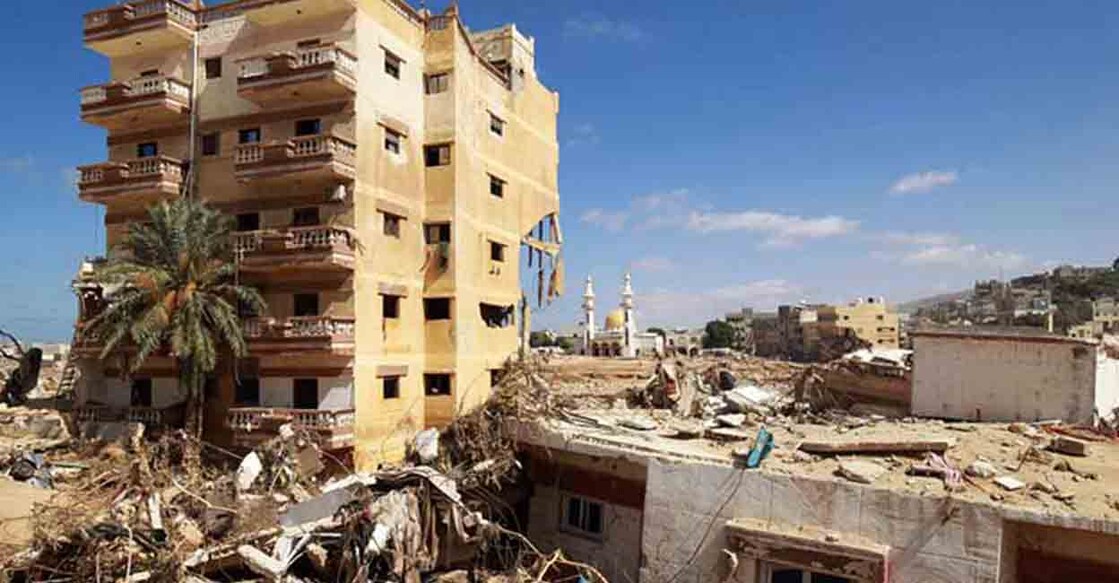Explained | UN’s Central Emergency Response Fund (CERF)

Mail This Article
The United Nations is providing aid to areas in eastern Libya after extreme rainfall caused devastating flooding and loss of lives over the weekend, and has issued an urgent appeal to donors for $71.4 million.
More than 5,000 people have died and thousands more are reported missing, many of them residents of Derna after it was struck by a torrent of water from two dams which burst, sweeping away whole neighbourhoods of the port city.
UN aid coordination office OCHA issued an urgent appeal to donors for $71.4 million to respond to the needs of around 250,000 people impacted by the floods in Libya over the next three months, saying death tolls could rise without more help.
OCHA estimates that more than 880,000 people, in five provinces, live in areas directly affected by the storm and flash floods.
Martin Griffiths, Emergency Relief Coordinator, announced an initial allocation of $10 million from the Central Emergency Response Fund (CERF) to support those affected by the floods.
The UN World Food Programme (WFP) said its planned emergency operation will aim to provide monthly food assistance to 100,000 people in flood-affected areas for the next three months.
Central Emergency Response Fund (CERF)
• The Central Emergency Response Fund (CERF) is a humanitarian fund established by the UN General Assembly in December 2005 and launched in March 2006.
• CERF seeks to enable more timely and reliable humanitarian assistance to those affected by natural disasters and armed conflicts.
CERF’s objectives:
i) To promote early action and response to reduce loss of life.
ii) To enhance response to time-critical requirements.
iii) To strengthen core elements of humanitarian response in underfunded crises.
• CERF’s rapid response window allows country teams to kick-start relief efforts immediately in a coordinated and prioritized response when a new crisis emerges.
• The Emergency Relief Coordinator manages CERF on behalf of the UN Secretary-General and is supported by the CERF secretariat, which ensures that funds are allocated properly, disbursed in a timely manner, and that the use of funds is reported appropriately and transparently.
• Since its inception, 126 UN Member States and observers, as well as regional governments, corporate donors, foundations and individuals, made it possible for humanitarian partners to deliver over $5.5 billion in life-saving assistance in over 100 countries and territories.
What is the purpose of UN OCHA?
• In December 1991, the General Assembly adopted a resolution to strengthen the United Nations response to complex emergencies and natural disasters, while improving the overall effectiveness of humanitarian operations in the field.
• The resolution also created the high-level position of Emergency Relief Coordinator (ERC).
• Soon after the resolution was adopted, the Secretary-General established the Department of Humanitarian Affairs (DHA).
• In 1998, as part of the Secretary-General’s programme of reform, DHA was reorganised into the Office for the Coordination of Humanitarian Affairs (OCHA). Its mandate was expanded to include the coordination of humanitarian response, policy development and humanitarian advocacy.
• OCHA carries out its coordination function primarily through the Inter-Agency Standing Committee (IASC), which is chaired by the ERC.
• Participants include all humanitarian partners, from United Nations agencies, funds and programmes, to the Red Cross movement and NGOs. The IASC ensures inter-agency decision-making in response to complex emergencies. These responses include needs assessments, consolidated appeals, field coordination arrangements and the development of humanitarian policies.




